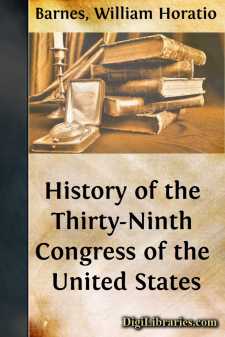Categories
- Antiques & Collectibles 13
- Architecture 36
- Art 48
- Bibles 22
- Biography & Autobiography 813
- Body, Mind & Spirit 141
- Business & Economics 28
- Children's Books 12
- Children's Fiction 9
- Computers 4
- Cooking 94
- Crafts & Hobbies 4
- Drama 346
- Education 46
- Family & Relationships 57
- Fiction 11826
- Games 19
- Gardening 17
- Health & Fitness 34
- History 1377
- House & Home 1
- Humor 147
- Juvenile Fiction 1873
- Juvenile Nonfiction 202
- Language Arts & Disciplines 88
- Law 16
- Literary Collections 686
- Literary Criticism 179
- Mathematics 13
- Medical 41
- Music 40
- Nature 179
- Non-Classifiable 1768
- Performing Arts 7
- Periodicals 1453
- Philosophy 64
- Photography 2
- Poetry 896
- Political Science 203
- Psychology 42
- Reference 154
- Religion 513
- Science 126
- Self-Help 83
- Social Science 81
- Sports & Recreation 34
- Study Aids 3
- Technology & Engineering 59
- Transportation 23
- Travel 463
- True Crime 29
History of the Thirty-Ninth Congress of the United States
Categories:
Description:
Excerpt
SPEAKER OF THE HOUSE OF REPRESENTATIVES.
The Congress that has just passed away has written a record that will be long remembered by the poor and friendless, whom it did not forget. Misrepresented or misunderstood by those who denounced it as enemies, harshly and unjustly criticised by some who should have been its friends, it proved itself more faithful to human progress and liberty than any of its predecessors. The outraged and oppressed found in these congressional halls champions and friends. Its key-note of policy was protection to the downtrodden. It quailed not before the mightiest, and neglected not the obscurest. It lifted the slave, whom the nation had freed, to the full stature of manhood. It placed on our statute-book the Civil Rights Bill as our nation's magna charta, grander than all the enactments that honor the American code; and in all the region whose civil governments had been destroyed by a vanquished rebellion, it declared as a guarantee of defense to the weakest that the freeman's hand should wield the freeman's ballot; and that none but loyal men should govern a land which loyal sacrifices had saved. Taught by inspiration that new wine could not be safely put in old bottles, it proclaimed that there could be no safe or loyal reconstruction on a foundation of unrepentant treason and disloyalty.
The first session of the Thirty-ninth Congress proposed, as their plan of Reconstruction, a Constitutional Amendment. It was a bond of public justice and public safety combined, to be embodied in our national Constitution, to show to our posterity that patriotism is a virtue and rebellion is a crime. These terms were more magnanimous than were ever offered in any country under like circumstances. They were kind, they were forbearing, they were less than we had a right to demand; but in our anxiety, in our desire to close up this question, we made the proposition. How was it received? They trampled upon it, they spat upon it, they repudiated it, and said they would have nothing to do with it. They were determined to have more power after the rebellion than they had before.
When this proposition was repudiated, we came together again, at the second session of the same Congress, to devise some other plan of reconstruction in place of the proffer that had been spurned. We put the basis of our reconstruction, first, upon every loyal man in the South, and then we gave the ballot also to every man who had only been a traitor. The persons we excluded, for the present, from suffrage in the South, were not the thousands who struggled in the rebel army, not the millions who had given their adhesion to it, but only those men who had sworn allegiance to the Constitution and then added to treason the crime of perjury.
Though we demand no indemnity for the past, no banishment, no confiscations, no penalties for the offended law, there is one thing we do demand, there is one thing we have the power to demand, and that is security for the future, and that we intend to have, not only in legislation, but imbedded in the imperishable bulwarks of our national Constitution, against which the waves of secession may dash in future but in vain....


